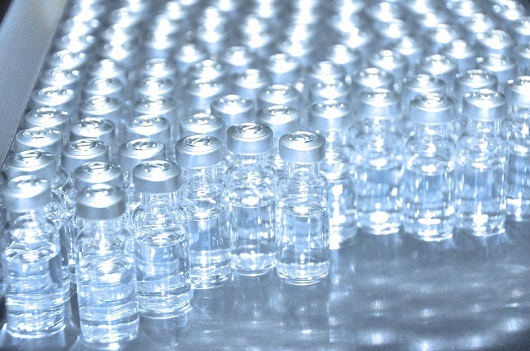COVID-19 vaccines applied in Brazil provide additional protection to who had already the disease
04/01/2022
Cristina Azevedo (Fiocruz News Agency)
A study published on medRXiv, this Wednesday (December 29th), shows that the four vaccines applied in Brazil provide a high degree of additional protection against symptomatic infections and severe cases of COVID-19 in people who had already contracted Sars-CoV-2 previously. The study, led by Julio Croda and Manoel Barral-Neto, Fiocruz researchers, also reinforces the importance of a full vaccination scheme, even for those people.
Vaccine production at Bio-Manguinhos (Image: Bernardo Portella/Bio-Manguinhos/Fiocruz)
As preprint (without peer review), Effectiveness of CoronaVac, ChAdOx1, BNT162b2 and Ad26.COV2.S among individuals with prior SARS-CoV-2 infection in Brazil shows that the four vaccines present effectiveness from 39% to 65%, preventing the symptomatic forms of the disease. In the case of the three vaccines with a two-dose scheme (Coronavac, AstraZeneca and Pfizer), the second dose provides significantly higher effectiveness when compared to the first one. The average of protection against hospitalization and death exceeds 80% 14 days after the full vaccination scheme – when compared to non-vaccinated and infected people.
“The importance of being vaccinated is the main message, and the need for these two doses to maximize the protection. We see that some countries recommend only one dose for those who had COVID, considering that they already have a certain level of neutralizing antibodies. But this kind of real-life assessment of effectiveness shows that there is an additional gain with the second dose. It is a substantial gain against severe cases”, explains Julio Croda, a researcher at Fiocruz Mato Grosso do Sul and the main investigator of the study.
Effectiveness against reinfection
The effectiveness of Sars-CoV-2 vaccines had already been proven in people who had never had the disease, but their effects in previously infected individuals were unclear. Based on the Brazilian national database on notification, hospitalization, and vaccination, researchers used a negative test design to verify the effectiveness of Coronavac, AstraZeneca, Janssen and Pfizer in previously infected people.
“For AstraZeneca and Pfizer, there was only one paper on severe outcomes, and it involved only 75 individuals. There was nothing on Janssen and Coronavac for symptomatic disease and severe cases,” notes Croda.
A total of 22,565 individuals over 18 years of age who had two positive RT-PCR tests and 68,000 who had a positive test and then a negative one, between February and November of this year, were evaluated.
The researchers found that after initial infection, the effectiveness for further symptomatic disease 14 days after the full vaccination scheme is 39.4% for Coronavac, 56.0% for AstraZeneca, 44.0% for Janssen, and 64.8% for Pfizer. For two-dose vaccines, the effectiveness against hospitalization and death in the same period is 81.3% with Coronavac, 89.9% with AstraZeneca, and 89.7% with Pfizer. With Janssen, one-dose vaccine, is 59.2%.
Hybrid immunization
Sars-CoV-2 infection induces robust responses of B and T cells, related to immunity. People who had already contracted the virus presented, then, a lower risk of symptomatic infection and severe cases of the disease. Many are based on this to discuss the need to vaccinate or not those who have already had Covid-19, or even if the person should take only one dose, as Croda recalls. The emergence of new, more transmissible variants, capable of escaping the immune system and resulting in new waves of infection and reinfection, renewed discussions on the subject.
“We found that the second dose of CoronaVac, ChAdOx1, and BNT162b2 provided significant additional protection against symptomatic infections and the severe form of the disease,” the text says.
According to the study, this high degree of hybrid immunization, resulting from the combination of infections and vaccines, could explain why Brazil, despite having a vaccine coverage comparable to that of the United States and European countries, has not observed a similar increase in hospitalizations and deaths in the period when the Delta variant became prevalent.
Various Fiocruz units and Brazilian and foreign institutions participated in the study. The study has researchers of Gonçalo Moniz Institute (Fiocruz Bahia); Center for Data Integration and Knowledge for Health (Cidacs/Fiocruz Bahia); Fiocruz Brasília and Fiocruz Mato Grosso do Sul; in addition to scientists of the Federal University of Bahia; Stanford University; Barcelona Institute for Global Health; Hospital das Clínicas of the School of Medicine of the University of São Paulo; London School of Hygiene and Tropical Medicine; Federal University of Ouro Preto; University of Florida; Yale School of Public Health; University of Brasília; Emory University; University of the State of Rio de Janeiro; and Federal University of Mato Grosso do Sul.





